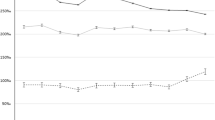Abstract
Objectives
This study was designed to explore the utilization and non-utilization of pre-hospital emergency care by migrants and non-migrants, and the factors that influence this behaviour.
Methods
A cross-sectional representative German survey was conducted in a sample of 2.175 people, 295 of whom had a migration background. An additional sample of 50 people with Turkish migration background was conducted, partially in the Turkish language. Apart from socio-demographics, the utilization of emergency services and the reasons for non-utilization were assessed.
Results
Migrants had a higher utilization rate of pre-hospital emergency care (RR = 1.492) than non-migrants. Furthermore, migrants who were not born in Germany had a lower utilization rate (RR = 0.793) than migrants who were born in Germany. Regarding non-utilization, the most frequently stated reasons belonged to the categories initial misjudgment of the emergency situation and acting on one’s own behalf, with the latter stated more frequently by migrants than by non-migrants.
Conclusions
To prevent over-, under-, and lack of supply, it is necessary to transfer knowledge about the functioning of the medical emergency services, including first aid knowledge.
Similar content being viewed by others
References
Allerbeck KR, Hoag WJ (1985) Wenn deutsche Ausländer befragen. Zeitschrift für Soziologie 14:241–246
Al-Shaqsi S (2010) Models of international emergency medical service (EMS) systems. Oman Med J 25:320–323
Aminzadeh F, Dalziel WB (2002) Older adults in the emergency department: a systematic review of patterns of use, adverse outcomes, and effectiveness of interventions. Ann Emerg Med 39:238–247
Anson O, Carmel S, Levin M (1991) Gender differences in the utilization of emergency department services. Women Health 17:91–104
Blohm M, Diehl C (2001) Wenn Migranten Migranten befragen. Zum Teilnahmeverhalten von Einwanderern bei Bevölkerungsbefragungen. Zeitschrift für Soziologie 30:223–242
Borde T, David M (2003) Gibt es Besonderheiten bei der Inanspruchnahme klinischer Notfallambulanzen durch Migrantinnen und Migranten? In: Borde T, David M (eds) Gut versorgt?. Migrantinnen und Migranten im Gesundheits- und Sozialwesen, Mabuse
Correa-Velez I, Sundararajan V, Brown K, Gifford SM (2007) Hospital utilisation among people born in refugee-source countries: an analysis of hospital admissions, Victoria, 1998–2004. Med J Aust 186:577–580
Dingoyan D, Schulz H, Mosko M (2012) The willingness to participate in health research studies of individuals with Turkish migration backgrounds: barriers and resources. Eur Psychiatry 27(Suppl 2):4–9
Gabler S, Häder S (2002) Idiosyncrasies in telephone sampling-the case of Germany. Int J Pub Opin Res 14:339–345
Harkness JA (2008) Comparative survey research: goals and challenges. In: de Leeuw JJ, Hox JJ, Dillmann DA (eds) International handbook of survey methodology. Lawrence Erlbaum Associates, New York, pp 56–77
Hjern A, Haglund B, Persson G, Rosen M (2001) Is there equity in access to health services for ethnic minorities in Sweden? Eur J Pub Health 11:147–152
Hussain-Gambles M, Atkin K, Leese B (2004) Why ethnic minority groups are under-represented in clinical trials: a review of the literature. Health Soc Care Community 12:382–388
Killinger E (2009) Die Besonderheiten der Arzthaftung im medizinischen Notfall. Springer, Berlin
Koch G (2008) Zur Entwicklung Interkultureller Kompetenz im Studium. Theoretische und pragmatische Ansatzpunkte. In: Bahl A (ed) Kompetenzen für die globale Wirtschaft Begriffe—Erwartungen—Qualifikationsansätze. Bertelsmann Verlag, Bielefeld, pp 189–207
Li G, Lau JT, McCarthy ML, Schull MJ, Vermeulen M, Kelen GD (2007) Emergency department utilization in the United States and Ontario, Canada. Acad Emerg Med 14:582–584
Mayring P (2010) Qualitative Inhaltsanalyse: Grundlagen und Techniken. Beltz, Weinheim
Norredam M, Krasnik A, Sorensen TM, Keiding N, Michaelsen JJ, Nielsen AS (2004) Emergency room utilization in Copenhagen: a comparison of immigrant groups and Danish-born residents. Scand J Pub Health 32:53–59
Norredam M, Mygind A, Nielsen AS, Bagger J, Krasnik A (2007) Motivation and relevance of emergency room visits among immigrants and patients of Danish origin. Eur J Pub Health 17:497–502
Ong BN, Yip MP, Feng S, Calhoun R, Meischke HW, Tu SP (2012) Barriers and facilitators to using 9-1-1 and emergency medical services in a limited English proficiency Chinese community. J Immigr Minor Health 14:307–313
Rue M, Cabre X, Soler-Gonzalez J, Bosch A, Almirall M, Serna MC (2008) Emergency hospital services utilization in Lleida (Spain): a cross-sectional study of immigrant and Spanish-born populations. BMC Health Serv Res 8:81
Schenk L (2002) Migrantenspezifische Teilnahmebarrieren und Zugangsmöglichkeiten im Kinder- und Jugendgesundheitssurvey. Gesundheitswesen 64:59–68
Schenk L, Neuhauser H (2005) Methodische Standards für eine migrantensensible Forschung in der Epidemiologie. Epidemiologie und Gesundheitsberichterstattung 48:279–286
Sheikh M, Nugus PI, Gao Z, Holdgate A, Short AE, Al Haboub A, Macintyre CR (2011) Equity and access: understanding emergency health service use by newly arrived refugees. Med J Aust 195:74–76
Statistisches Bundesamt (2015) Bevölkerung und Erwerbstätigkeit. Bevölkerung mit Migrationshintergrund—Ergebnisse des Mikrozensus 2014. Statistisches Bundesamt, Wiesbaden
Funding
The study was conducted as part of the project “Rescue, Aid and Culture—Intercultural Competence in Civil Protection II” and funded by the Federal Office of Civil Protection and Disaster Assistance, Germany (Grant-Number: BBK-III. 1-413-10-00-396).
Author information
Authors and Affiliations
Corresponding author
Ethics declarations
All procedures performed in the study involving human participants were in accordance with the ethical standards of the institutional research committee (Ethics Commission of the University of Greifswald; 17/12/2013) and with the 1964 Helsinki declaration and its later amendments or comparable ethical standards.
Conflict of interests
We declare that we have no conflict of interest.
Informed consent
Informed consent was obtained from all individual participants included in the study.
Rights and permissions
About this article
Cite this article
Kietzmann, D., Knuth, D. & Schmidt, S. (Non-)utilization of pre-hospital emergency care by migrants and non-migrants in Germany. Int J Public Health 62, 95–102 (2017). https://doi.org/10.1007/s00038-016-0904-y
Received:
Revised:
Accepted:
Published:
Issue Date:
DOI: https://doi.org/10.1007/s00038-016-0904-y




